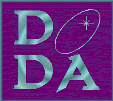You are here
2023 Rubin Prize Winner - Carl Rodriguez
 The American Astronomical Society’s Division on Dynamical Astronomy (DDA) is pleased to announce that the 2023 recipient of the Vera Rubin Early Career Award is Dr. Carl Rodriguez of the University of North Carolina, for his novel and sustained contributions to our understanding of dynamics of stars in dense stellar systems as well as his pioneering considerations of dynamical scenarios for gravitational wave sources originating from globular clusters.
The American Astronomical Society’s Division on Dynamical Astronomy (DDA) is pleased to announce that the 2023 recipient of the Vera Rubin Early Career Award is Dr. Carl Rodriguez of the University of North Carolina, for his novel and sustained contributions to our understanding of dynamics of stars in dense stellar systems as well as his pioneering considerations of dynamical scenarios for gravitational wave sources originating from globular clusters.
Dr. Rodriguez earned his Ph.D. from Northwestern University in 2016 under the direction of Prof. Fred Rasio. He held the Pappalardo postdoctoral fellowship at the Massachusetts Institute of Technology and the ITC fellowship at Harvard University before taking up a faculty position at Carnegie Mellon University. In 2022 he moved to his present post as Assistant Professor at UNC.
The detection of gravitational wave (GW) signals by the Laser Interferometer Gravitational-wave Observatory (LIGO) in 2015 opened up an entirely new area of observational astrophysics with the potential to advance fundamental physics and constrain basic parameters of compact object mergers. While it has been known that merging compact binaries can be formed dynamically in the dense cores of old globular clusters, Dr Rodriguez' N-body gravitational modelling of mergers within dense star clusters made clear predictions for their rates and physical properties. Specifically, the work correctly predicted that LIGO’s first GW detections would be from merging binary black holes more massive than the black holes observed through X-ray observations in our own galaxy, thus establishing dynamical processes as one of the leading formation mechanisms of merging black holes.
Further improvements in the model led Dr Rodriguez to recognise the role of relativistic effects in creating, through repeated mergers, black holes more massive than those formed by single stars, thus offering a compelling theoretical interpretation of high-mass coalescence events subsequently observed by LIGO. Work also led by Dr Rodriguez made fundamental contributions to understanding the distribution of spins in binary black holes, in particular showing that merging black hole binaries with a significant spin-orbit anti-alignment arise uniquely from dynamical formation, as well as predicting mergers with non-negligible eccentricity.
Dr. Rodriguez will be invited to give a lecture at the 55th annual DDA meeting in the spring of 2024.
